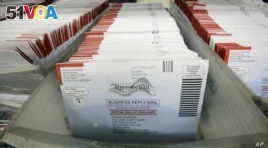07 April 2020
Millions of Americans are staying home to prevent spreading the coronavirus. As a result, they have turned to technology to do business and to talk to family and friends.
However, some groups are suggesting that voting in this year's presidential election might depend on mailing ballots. They say the answer to staying safe may be in the hands of the United States Postal Service.
Most Americans, age18 or older are used to voting at their local polling place. This year's general election in November could possibly be different – going out to vote in large numbers might be considered too risky.

FILE - In this Nov. 1, 2016, file photo, mail-in ballots for the 2016 General Election are shown at the elections ballot center at the Salt Lake County Government Center, in Salt Lake City.
Already, 14 states have postponed their primary election voting because of the virus. The state of Wisconsin is holding its primary on Tuesday as planned.
The postponements have caused a big problem for the presidential nominating system.
For this reason, election officials across the United States are considering mail ballots. Vote-by-mail offers a way to protect the health of voters while permitting them to exercise their rights as citizens.
"We're talking about an emergency situation, but there is bipartisan support...for vote-by-mail election reform," said Amber McReynolds. She is chief executive officer of the National Vote at Home Institute. It is a not-for-profit group that supports mail-in ballots.
Absentee ballots that are mailed to voting centers already exist, but voting by mail would be a change for many Americans. Those against the change, and even some supporters, wonder if there is enough time to put a secure system in place by November.
Creating a new vote-by-mail system would be a big logistical problem, researchers Collier Fernekes and Rachel Orey wrote in a report for the Bipartisan Policy Center.
The recent $2.4 trillion coronavirus stimulus bill passed by Congress and signed by President Donald Trump includes $400 million to help elections officials deal with coronavirus issues.
But those who support vote-by-mail are asking for more. Democratic Party members in the U.S. House and Senate have written bills to give all Americans the ability to vote by mail.
National vote, run locally
The United States will vote on November 3 to choose the president and members of Congress. However, election systems are run by state and local governments. Each has its own rules and laws about voting.
Of the 50 U.S. states, five hold all their elections mostly by mail: Colorado, Hawaii, Oregon, Utah and Washington.
There are large numbers of mail-in ballots in the other states. These "absentee" ballots are for voters in the military, those traveling at election time or those who cannot go their polling place for physical reasons.
Western and Midwestern states, and the District of Columbia, now permit anyone to use an absentee ballot for any reason. They include California, the state with the most voters. In the 2018 Congressional elections, more than 8 million Californians sent absentee ballots by mail, more than 65 percent.
Reuters news agency says Wyoming and Alaska have said they will use mail ballots this year.
It is estimated that nearly 25 percent of ballots were vote-by-mail in the 2016 presidential election.
A reality check
There are, however, problems. They include how to get Americans used to a whole new system and how to provide security.
Elizabeth Howard advises the Democracy Project of the Brennan Center for Justice on legal issues. She has had some experience with trying to change an election system quickly.
In August 2017, she was an official with Virginia's Department of Elections when security problems caused her to change the whole system. Although she was successful, she said changing the nation to vote-by-mail by November would be difficult and costly.
I'm Jill Robbins.
VOA's Masood Farivar reported this story. Susan Shand adapted it for VOALearning English. Mario Ritter, Jr.was the editor.
_________________________________________________________________
Words in This Story
primary– n.a vote that decides a party's candidate for a particular office in a general election
bipartisan– adj.relating to members of two political parties
logistics– n.the activities involved in organizing and planning a complicated event or process that involves many people
stimulus– n.government spending meant to cause economic growth
absentee ballot– n.a ballot cast by a person who is not able to vote in person at their voting